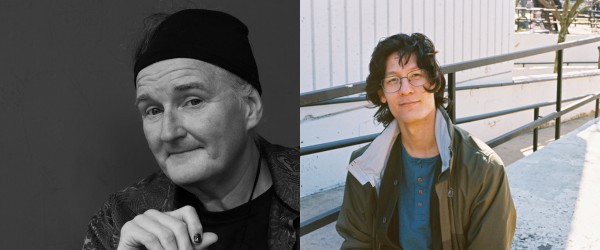About
Dobby Gibson Wins 2025 Four Quartets Prize
The T. S. Eliot Foundation and the Poetry Society of America are pleased to announce that Dobby Gibson is the winner of the 2025 Four Quartets Prize for his poem “Hold Everything” from the collection Hold Everything (Graywolf Press, 2024).
He was selected by judges Timothy Donnelly, Kimiko Hahn, and Patricia Smith.
The judges also selected CAConrad, for Listen to the Golden Boomerang Return (Wave Books, 2024), and Morgan Võ, for “To Market” from The Selkie (The Song Cave, 2024) as finalists for the prize.
Gibson will receive $20,000, and each finalist will receive $1,000.
The Four Quartets Prize—which was launched in 2018, on the 75th anniversary of the publication of T. S. Eliot’s Four Quartets in a single volume in America, in 1943—is a celebration of the multipart poem, and is awarded for a unified and complete sequence of poems published in America in a print or online journal, chapbook, or book in 2024.
Judges’ Citation, Four Quartets Prize Winner
Like Eliot’s Four Quartets, albeit a quarter of the length and considerably more funny, Dobby Gibson’s “Hold Everything” is a dazzlingly composed and profound meditation on time, persistence, and the kind of transcendence that can fit inside an ordinary human life. In its closely observed yet subtly rendered transition from bleak midwinter (“Outside, branches heavy with snow weigh / their options”) into an ambivalent spring (“the forsythia is spent, / and like us, for the moment, content to be still”), Gibson’s sequence articulates the flow of thought as it reaches for some foothold of significance “in the waking dream / of our lives.” By means of non sequitur, wild metaphor, rim shot–worthy one-liners, quotable aphorisms, and sheer poetic savoir faire, “Hold Everything” gives body to the shifting tracks and complex textures of an idiosyncratic but radically welcoming, representative mind, one that’s prone to entertaining enormous questions in small, contained spaces: An average morning, a suburban home, and the unrhymed, unmetered American sonnet.
And just as Eliot’s sequence reflects on poetry’s timeworn “way of putting it” and its “intolerable wrestling / with words and meanings,” Gibson’s likewise considers the poetic medium’s belatedness and limitations, but does so with so much flair that it makes a strong argument in favor for what it purports to lament: “Poems lie on the table like the cards / of a spent hand. I’m my only master, but I can’t read / my master’s writing.” Simile, polysemy, enjambment—poetic resources of all kinds are marshalled into “Hold Everything,” almost as if to build a showroom of what’s still possible for our old familiar ways, layering the poem’s larger themes and local phrasings, intensifying them, and preparing them to reside forever in the reader’s mind: “I look through my window like a museum guard growing / oblivious to a masterpiece.”
In the end, it might be that the antidote to such obliviousness is what Gibson’s poem is in search of above all else—a procedure for living, for pushing back against “the flat champagne / of our habits.” A means of resistance to the tendency of the act of living to dull our appreciation of being alive. With its wit, grace, wisdom, and openness to chance; with its will to awaken and unbreakable hope, its endless surprises and tireless service to its cause, “Hold Everything” performs one of poetry’s most satisfying magic tricks—it becomes what it sets out to look for.
**
Dobby Gibson is the author of Polar (Alice James Books, 2005), which won the Alice James Award; Skirmish (Graywolf Press, 2009); It Becomes You (Graywolf Press, 2013), which was a finalist for The Believer Poetry Award; Little Glass Planet (Graywolf Press, 2019); and Hold Everything (Graywolf Press, 2024). Gibson’ s poems have appeared in American Poetry Review, Harvard Review, The New Yorker, The Paris Review, New England Review, and Ploughshares, among other publications, and have been anthologized in books including Good Poems American Places (Penguin Books). He’s been a visitor to colleges and universities including Carnegie Mellon University, Harvard University, New York University, UMass-Amherst, and the University of Texas at Austin. Born in Minneapolis, Gibson earned his BA in English Literature from Connecticut College and an MFA in creative writing (fiction) from Indiana University. The recipient of fellowships from the Lannan Foundation, the McKnight Foundation, the Jerome Foundation, and the Minnesota State Arts Board, Gibson is a past board member of The Loft Literary Center and lives in Saint Paul, Minnesota.
Four Quartets Finalists

CAConrad has been writing poems for over 50 years and working with (Soma)tic poetry rituals for over 20 years. Their latest book is Listen to the Golden Boomerang Return (Wave Books / UK Penguin 2024). They received the Ruth Lilly Poetry Prize, a Creative Capital grant, a Pew Fellowship, a Lambda Poetry Award, and others. The Book of Frank is now available in 9 different languages, and they coedited SUPPLICATION: Selected Poems of John Wieners (Wave Books). They also exhibit poems as sculpture with recent solo shows in London’s Champ Lacombe, MOCA-Tucson, Fluent in Santander, and Batalha Centro in Porto. They teach at the Sandberg Art Institute and De Ateliers in Amsterdam.
Morgan Võ is a poet and librarian concerned with resonance, contingency, difficulty understanding, and the presence of the dead among the living. They are the author of The Selkie (The Song Cave, 2024). His poems were anthologized in Pathetic Literature (Grove Atlantic, 2023), and have most recently appeared in A Perfect Vacuum, Makhzin, and Changes Review. Originally from coastal Virginia, they live now in Brooklyn, New York.


